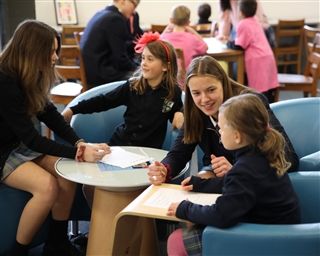By Jamie Elbert What would a Viking say to a Victorian? How would an Enlightenment satirist react to Shakespeare’s Macbeth? What is the difference between romance and Romanticism? Taking a ‘big history’ approach to poetry, the grade 10s have been studying how historical events and cultural context shaped literature from the year 428 to the present moment. Over the winter break, they read freely-chosen poetry from one of six eras, and upon returning worked with a small group to present the events, cultural values, inventions, art, and big names of the period to their classmates with the goal of relating this knowledge to the poetry they had read. Alongside practical reading and annotating strategies, class time was dedicated to exploring the range of voices speaking out of each era and how their poetic techniques reflect contemporary values and concerns. Having studied the many forms and purposes of poetry, the 10s adapted odes and sonnets to fill-in-the-blank sheets and welcomed grade 1 poetry buddies to the senior school campus for some lively collaborative poetry writing. However, we didn’t need to come with so many templates: once the grade 1s got rolling, the coloured paper was flying off the tables as 10s and 1s combined ideas to make new poems about love and being happy. The excitement was evident in the number of grade 1s who read their poems for the group, and the big smiles in the photo booth. Afterwards, the grade 10s reflected. Here is some of what they had to say: “We learned that they know a lot and have opinions and are very excited to share their poetry.” “The Grade 1s were smart and wrote well and were very enthusiastic and well-versed. We admired their creativity when they wrote their poems, as they avoided using the templates. They were very energetic and hungry.” “The kids were very sweet and creative. The grade one I was partnered with was really sweet, and took initiative immediately when we started writing.” “Kids sometimes don’t make sense, so when writing the poem I had to edit the template a bit.” “Overall, the experience was very enlightening and interesting.” Together, the Junior and Senior students ended up writing a wide variety of poems about the people and things they love. As a teacher, I particularly appreciated the poem about teachers, in which we are described as “better than clocks.” The grade 10s will complete their study with a poetry portfolio of original compositions and a reflection on the big question: To what extent do we need contextual knowledge to understand or appreciate poetry? You might find a grade 10 and ask them whether their personal style is more Renaissance or post-modern, more Pope or cummings. But if you ask about the Romantics, set aside some time – you’ll get some opinions.





